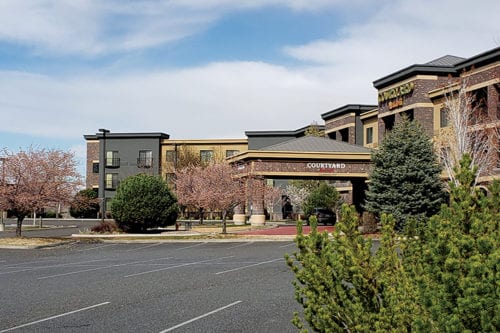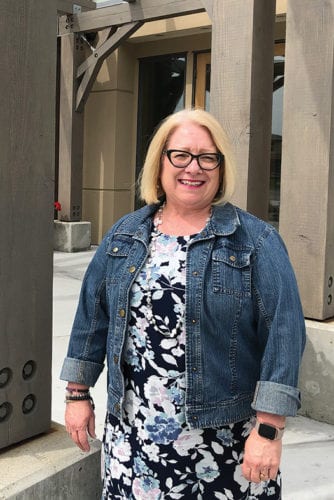
Home » Tri-City hoteliers think outside the box as pandemic emptied rooms
Tri-City hoteliers think outside the box as pandemic emptied rooms

May 15, 2020
Tri-City hoteliers found creative and unexpected ways to stay relevant after a wave of cancellations washed over the industry on what one owner called Black Friday in March.
“People are definitely thinking outside the box,” said Michael Novakovich, president and chief executive officer of Visit Tri-Cities, the region’s tourism marketing agency. He’s heard of only five hotels in the area closing after Gov. Jay Inslee issued the Stay Home, Stay Healthy order to slow the spread of coronavirus.
The rest remained open as best they could, with skeletal staffs.

They have adapted by welcoming health care workers and first responders, by serving contract customers such as railroad crews, and in one case, by sending staff to help a local nonprofit get off the ground.
“Travel and tourism were at the front end of this. People just stopped moving around,” Novakovich said. More than 6,000 local jobs are tied to hospitality, including lodging and dining. As the pandemic emptied rooms, the industry and operators looked for fresh ways to preserve their business so they can ramp up quickly when travel and tourism resumes.
A-1 Hospitality Group, a Kennewick-based hotel chain with 300 rooms locally, stayed open. It welcomed first responders and health care workers who did not want to go home to their families by offering steep discounts, said Taran Patel, managing partner for the family-owned company.
In Richland, The Lodge at Columbia Point rehired workers after it secured a Paycheck Protection Program loan through the CARES (Coronavirus Aid Relief and Economic Security) Act.
Rather than keep idle workers at the hotel, it paid staff to work at Grace Kitchen, a new nonprofit that is transforming the former Union Gospel Mission men’s shelter in Pasco into a center where struggling women learn skills to support themselves.
A-1’s Patel said fallout from the coronavirus pandemic arrived with crushing severity. Phones rang with cancellations in mid-March as the stay-home order took hold. He called it Black Friday.
The company furloughed workers but stopped short of closing its doors. Business travel continued at a much-reduced level. Leisure travel evaporated, save for the Canadian winter birds racing home before the international boundary closed.
Guests may be scarce, but A-1 wanted its properties in ready-to-go form.
“What we’re trying to do is keep the doors open to set the stage for a quicker recovery,” Patel said.
The pandemic timing was a big challenge. A-1 opened the Courtyard by Marriott at the Tri-Cities Airport in February. The company spent four years working to ensure the Courtyard opened ahead of the busy spring sports tournament season.
“We nailed it,” Patel joked.
“Everyone prepares for a rainy day. No one prepares for an 80 percent drop in occupancy overnight.”

The Lodge at Columbia Point had its own Black Friday, said Wendy Higgins, general manager for the 82-room boutique hotel overlooking the Columbia River. Bookings dropped to four or fewer rooms a night, she said.
It closed both Drumheller’s and Vine, its dine-in restaurant and lobby bar, respectively. It closed the pool and spa. It locked the doors to the patio and its steps to the Richland waterfront walkway.
It had to stop letting the public use its lobby bathrooms. It could not devote staff to sanitize the facilities after each visitor, Higgins said.
The Lodge is privately owned and managed by Escape Lodging of Portland. The Portland operator applied for Paycheck Protection Program loans for all its properties. The Lodge is one of the three that received it.
The money let Higgins bring back furloughed staffers, but it did not fill rooms with paying guests.
An employee suggested partnering with a nonprofit. Intrigued, she asked her church, Columbia Community Church, to suggest organizations that might need an extra hand from a seasoned hotel crew.
It suggested Grace Kitchen, led by executive director Amanda Lorraine. Higgins was intrigued and the hotel’s owners were too.
Higgins emailed Lorraine. A few minutes later, Higgins heard a woman checking into the hotel with her husband remark on the lobby floor. “That would look good at Grace Kitchen,” the woman said.
It was Lorraine.
“We call it our grace moment,” Higgins said.
The Union Gospel Mission gave its former men’s shelter in Pasco to the Lorraines in March for the nominal sum of $10, a show of support for their goal. They faced the daunting task of clearing it out, painting and repairing the impacts of heavy use over its decades as a men’s shelter.
Progress was good and before the pandemic, Amanda Lorraine expected to bring three women on full time by late April. That was delayed and she welcomed the assist from the Lodge, one of many organizations that stepped up, she noted.
Higgins shared the idea with staff. No one thought it was a bad one. Twenty-seven workers headed to Grace Kitchen the first day, armed with donated masks. Higgins had ordered masks for workers, but they were misdelivered to Texas.
Higgins and Amanda Lorraine say it has been a positive experience for everyone.
The Lodge crew regularly shows up with items to donate, even when Amanda Lorraine tells them they do not need to. Higgins predicts it is the start of a long relationship between her hotel and Grace Kitchen, which will eventually offer catering services and a full restaurant.
“To come off unemployment and give back to the community, it’s been very rewarding,” she said.
Bookings also have begun to pick up after dipping to one or four rooms rented a night.
By late April, 40 rooms were occupied. The parking lot began to fill.
Higgins said guests are Tri-Citians taking a mini break from home and children. They can order food and beverages in their rooms and recharge on their balconies. Who is minding the kids?
“I don’t ask,” she said.
Patel said local demand will drive the recovery. It is not clear when Washington’s economy will return to normal.
“What we’re hoping for is when things open up, there will be severe cabin fever,” he said. “Consumers will have the means to support hotels and restaurants and barbers.”
The Visit Tri-Cities team is building a marketing campaign around the idea that people will want to drive to rural areas to recreate after being cooped up for months, Novakovich said.
Business travel is not expected to resume soon, but the tourism industry expects leisure and sports will come back first.
The Tri-Cities can draw from Seattle, Portland, Spokane and Boise, Novakovich said.
It is within reasonable driving distance, small enough to register as rural and big enough to boast city amenities and strong hospitals. It is not hard to keep a six-foot distance between people.
“We have wide open spaces. There’s something here for everybody,” he said.
Local News Hospitality & Meetings
KEYWORDS may 2020





